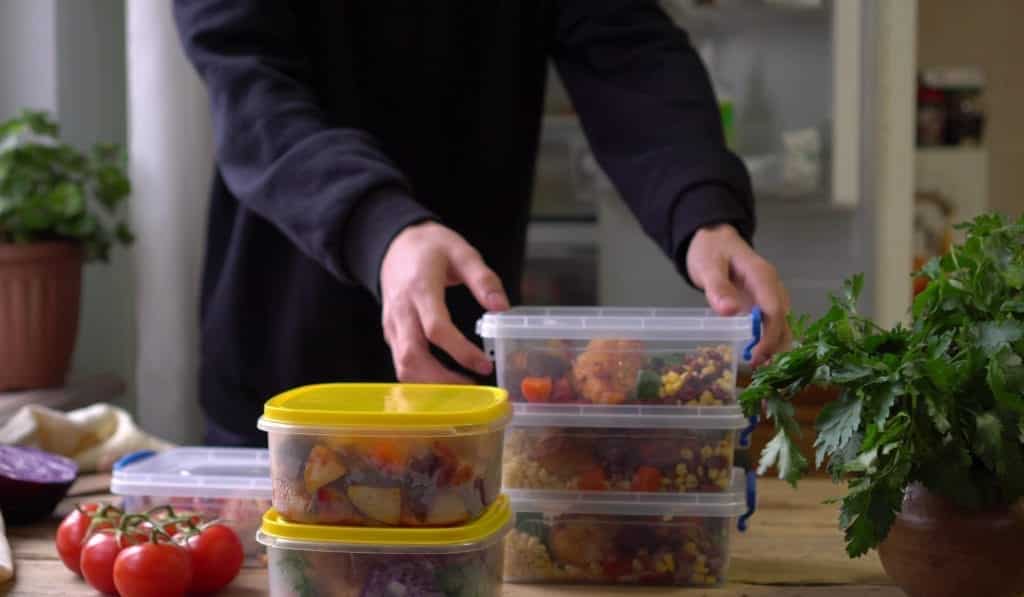More than anything else the success of your meal plan efforts is going to depend on the dishes you have planned out, but all ‘prep work’ really means is being one step ahead in making your meals. Having vegetables chopped, liquids measured, and meat thawed are all types of prep work. But it can also mean going a little further and doing some of the actual cooking ahead of time.

This means things like making soups or stews and freezing them, or cooking meat to refrigerate and reheat later on.
What Exactly Is Prep Work?
Prep work is a large part of meal planning, and the main reason it’s hailed as a time saver.
Having meals picked ahead of time removes those half-hour deliberations of what to make for dinner every night, but even when you finally settle on something (that isn’t delivery) there’s still the time you need to cook it.
Even if you have the ingredients and everyone in your household is in agreement they might not be willing to wait.
You might not have the energy to make it either. Prep work rids you of that added frustration of having to cook which inevitably comes along with making those decisions last minute.
Things to Remember
By now you’re probably very eager to grab the rest of your ingredients and go to town.
And who could blame you? Deciding to start meal planning is a big step towards living a healthier lifestyle, and changes like that can be really exciting.
But before diving in too deep there are a few things to keep in mind on your meal planning journey.

Trial and Error
No one gets it right the first time. The point of having a personalized meal planner is to find things that work best for you and suit your needs, but no one knows ahead of time what that looks like.
This can be stressful or discouraging, which is why it’s so important to have highlighted your goals before starting.
Reminding yourself of why you started and what you plan to gain from this will keep you motivated and inspired to keep trying.
To prevent this you can start by only planning a few meals each week.
Follow this up by a few days. Then the entire week.
But set a schedule for yourself of when to start doing more, don’t wait until you feel like you might be ready to take on more.
Sticking to a schedule will keep you more organized with your prep work and grocery shopping, and that sense of urgency it creates will give you a stronger feeling of satisfaction for being able to meet that deadline.
You will benefit greatly by shifting your perspective here. Don’t think of them as mistakes, they’re learning opportunities, and you’re going to learn a lot by meal planning. Why?
There’s Always More to Learn
We’ve all heard that expression ‘you learn something new every day’. Even the planning and prepping pros will affirm that you will continue to learn new things in your meal planning journey.
Aside from the obvious of new recipes or ingredients you’ve never heard of, there are plenty of tips and tricks for navigating around the kitchen you will uncover.
You might also learn creative ways to repurpose old containers, alternative uses for food waste (lemon peels are a goldmine for additional health benefits!), and new ways to stay organized.
You might find yourself inspired to adopt other healthy lifestyle changes too.
A new workout routine, morning meditation, skincare regimens, and gratitude journals are all excellent ways to promote wellness and introduce some more positivity into your life.
Prioritize Your Health
Dietary restrictions means much more than allergies or intolerance. For example there are many prescription medications, from blood pressure to psychiatric, which have a negative interaction with grapefruit.
Chia seeds can significantly lower blood pressure. Yet both of these foods have a plethora of potential health benefits. A sudden increase in fiber intake can result in the opposite of what fiber is supposed to help with.
Meal planning and prepping is supposed to help someone’s overall well-being, but adopting a healthier lifestyle doesn’t mean you’re suddenly imbued with excess levels of energy.
Everyone has their own limits, and honoring them isn’t the same as being lazy or giving up. Not everyone has the physical or mental energy to do it all in one day, and that’s okay.
If chronic illness makes it harder for you to do it all in one sitting then don’t push yourself to the point of exhaustion. Prioritize your health as a whole, not just healthy eating.
You Have Nothing To Lose
Meal planning is a long term commitment, not just a decision you make.
But it’s also an investment in yourself, and a promise. It’s a promise to give your body the care and nutrients it deserves. It’s a promise to practice mindful spending and better budgeting habits.
Above all it’s a promise to be more proactive in creating a healthy lifestyle that allows you to enjoy your life to the fullest.
